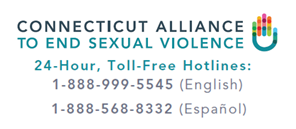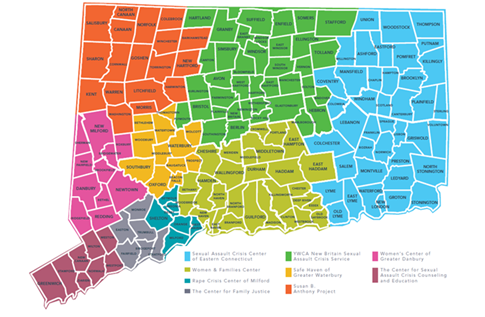Sexual Violence Prevention
Need Help? 
Our Mission
Prevent sexual violence by promoting positive individual, relationship, community, and societal attitudes and behaviors.

Our Vision
Connecticut Communities-Healthy, Safe, and Free of Sexual Violence.
Sexual Violence in Connecticut| Current Prevention Activities| Sexual Assault Awareness Month| Resources
Sexual Violence In Connecticut
Due to its prevalence and far-reaching effect on society, sexual violence is a critical public health issue. It is important to have a comprehensive approach to prevention, services, and justice that goes beyond the current system. An effective Public Health approach can bring together diverse communities and professionals to address complex health and social conditions.
Program History and Overview
The Sexual Violence Prevention Program, with funding from the Centers for Disease Control and Prevention (CDC), partners with the Connecticut Alliance to End Sexual Violence to provide primary prevention, education, and training to healthcare providers, schools and universities, law enforcement, social services providers, and the community regarding primary prevention of sexual violence. The program aims to prevent sexual violence in Connecticut by increasing individual pro-social knowledge and attitudes, communication skills for respectful intimate and peer relationships, organizational and community capacity for prevention, and societal norms that do not tolerate gender-based sexual violence or other forms of inequalities. This Program builds the capacity of Connecticut's 9 rape crisis centers to provide direct services for rape and other sexual assault victims and their families such as: crisis intervention, individual counseling, free and confidential 24-hour hotlines, including local rape crisis centers and transportation as necessary. These 9 rape crisis centers are depicted below.

Guiding Principles
- Preventing first-time perpetration and victimization;
- Reducing modifiable risk factors while enhancing protective factors associated with sexual violence perpetration and victimization;
- Using the best available evidence when planning, implementing, and evaluating prevention programs;
- Incorporating behavior and social change theories into prevention programs;
- Using population-based surveillance to inform program decisions and monitor trends; and
- Evaluating prevention efforts and using the results to improve future program plans.
Sexual Assault Awareness Month (SAAM).
This April, take action to prevent sexual violence.
SAAM 2025 Preview and Open Dialogue

Current Prevention Activities
The Sexual Violence Prevention Program encourages the development of comprehensive prevention strategies through a continuum of activities that address all levels of the social-ecological model. The model considers the complex interplay between individual, relationship, community and societal factors, and addresses risk and protective factors from multiple areas. This approach is more likely to prevent sexual violence across a lifetime than any single intervention. Activities carried out through vendors include:
- Implementing primary prevention strategies such as engaging bystanders, educating youth about healthy relationships, and changing social norms;
- Operating 24-hour free and confidential statewide hotlines in both English and Spanish;
- Building state and local capacity for program planning, implementation, and evaluation; and
- Evaluating state and local programs for outcomes and effectiveness.
In 2017, the CT Department of Public Health partnered with the Community Health Center Association of CT (CHCACT) and the CT Coalition Against Domestic Violence (CCADV) to foster system-level violence prevention within community health centers across Connecticut. This initiative is meant to continue for the next 5 years, with the ultimate goal of training all FQHCs and community health centers. Regional trainings will be held to connect each FQHC with the crisis centers in their region, and resources will be provided for model health center policies and interventions.
The following include presentations from the first training, which was held at Foxwoods Casino on October 25, 2019, in the Eastern CT region.
Health Impact of IPV, Human Trafficking and Sexual Assault
Best Practices for Health Centers
Intimate Partner Violence Background
Intimate Partner Violence Education: A Provider's Prospective
Becoming Trauma-Informed Workplaces
A Statewide Plan for Sexual Assault and Abuse Prevention and Awareness for Connecticut Schools
Acknowledging that sexual assault and abuse is a preventable problem in our state, the Connecticut State Legislature passed and the Governor signed into law PA 14-196 AN ACT CONCERNING A STATE-WIDE SEXUAL ABUSE AND ASSAULT AWARENESS PROGRAM for Connecticut school districts.
Department of Children and Families (DCF), State Department of Education (SDE)
and Connecticut Alliance to End Sexual Violence worked together with DPH to
develop a comprehensive statewide sexual assault and abuse prevention and
awareness plan to be implemented in all local and regional school districts in
Connecticut.
The program guidelines are available here.
Youth Primary Prevention
Youth Primary Prevention Trainings (YPPT) is a three-part series developed through a partnership with the Connecticut Alliance to End Sexual Violence for middle and high school students aimed to promote healthy relationships. The YPPT curriculum includes three core components: recognizing healthy relationships, challenging gender stereotypes, and developing bystander intervention skills. Facilitators engage with participants using exercises and group discussion. The aim of the curriculum is to be delivered as three separate sessions that build upon one another and ultimately increase the participants’ ability and confidence in preventing sexual violence.
Administrators and
educators can contact DPH or one of The Alliance community-based sexual assault
crisis service member programs to inquire about their availability to deliver
in-service presentations for teachers and/or K-12 programs for students in the
classroom. All presentations are designed to meet the performance indicators in
the new guidelines.
Where Do You Stand? Connecticut – Sexual Violence Prevention on College Campuses
Public Act 14-11, AN ACT CONCERNING SEXUAL ASSAULT, STALKING AND INTIMATE PARTNER VIOLENCE ON CAMPUS, was passed unanimously by the house and senate and is one of the most comprehensive campus sexual assault laws in the country. It includes mandatory sexual violence prevention education programs, and the utilization of bystander intervention strategies, for all students and staff at colleges and universities in our state. The Department of Public Health (DPH) partnered with the Connecticut Alliance to End Sexual Violence and the nationally recognized Men Can Stop Rape Project, to build Connecticut’s first state-wide sexual violence prevention campaign known as Where Do You Stand? Connecticut (WDYS?CT). The WDYS? CT campaign implemented sexual violence prevention strategies using the public health approach. The campaign focuses on men by challenging attitudes and behaviors that contribute to anti-social tendencies and violent crimes and encouraging men to become active participants in sexual violence prevention.
WDYS? CT professional trainings and educational sessions are being conducted across the state and at college campuses. College staff and administrators can contact DPH or one of The Alliance community-based sexual assault crisis service member programs to inquire about their availability to deliver these trainings to their organization.
Resources
Intimate Partner Violence in Connecticut - 2022 Update
Sexual Violence in Connecticut - 2023 Update
Healthy Communication With Kids
If you or someone that you know needs immediate help, please call the 24-hour free and confidential Statewide Hotline:
1-888-999-5545 English
1-888-568-8332 Español
Or visit the Connecticut Alliance to End Sexual Violence website to find a rape crisis center near you.

